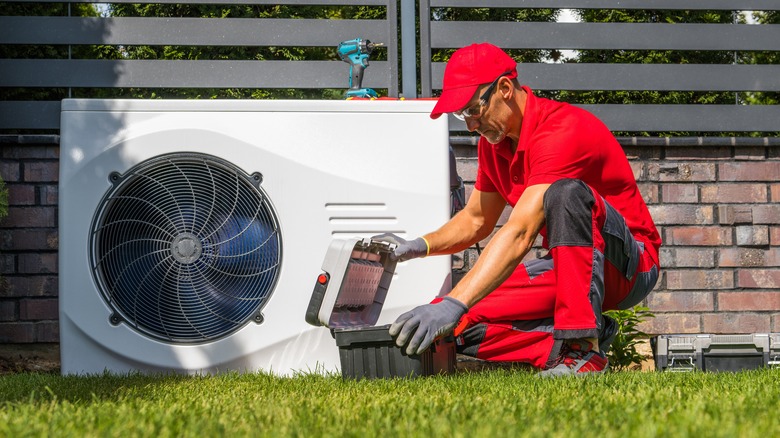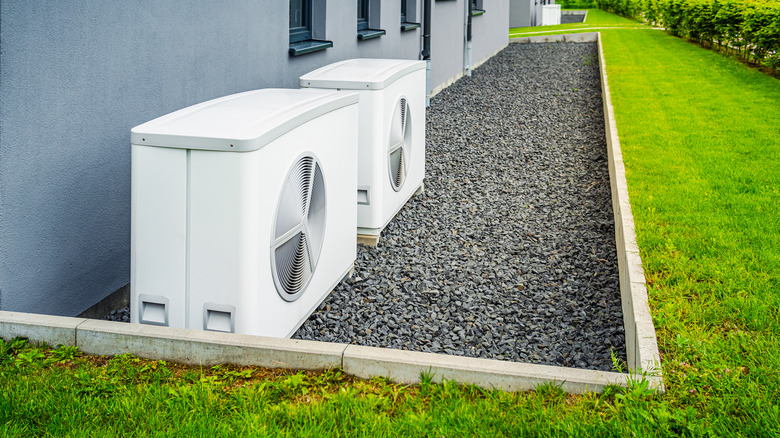Now Is The Time To Replace Your Old AC Unit With A Government Rebate
With kids out of school and temperatures on the rise, many Americans are looking forward to summer fun, but others are already facing an onslaught of skyrocketed electric bills. President Biden's Inflation Reduction Act aims to reduce home energy costs, making it easier for citizens to afford their homes and keep cool during increasingly hot summers. If all goes according to plan, the monumental move is set to slash electricity rates up to 9% by 2030. Of course, the federal government needs citizens to help to make this project as successful as possible. The 2022 Inflation Reduction Act and the Home Energy Rebates Program will reward homeowners who are willing to update their home's AC units to more energy-conscious models — with potential savings reaching into the thousands.
If your old AC unit is gasping for air or you're wrestling with how to DIY a heat pump repair, 2024 may be your lucky year for an upgrade. Of course, there are some caveats for the rebate program as well as some ever-important deadlines. Here's what you need to know about the Inflation Reduction Act's consumer tax credit, who and what it covers, and whether the incentive is really a cool deal for homeowners.
Earn a hefty tax credit for heat pump upgrades
Households that install heat pumps with a thermal efficiency rating of at least 75% could receive up to $2,000 in tax credits! Not to mention, the additional savings in energy costs to homeowners who install the new heat pump. For those who decide to purchase a new heat pump in 2024, the rebate will need to be applied when you file this year's taxes by the deadline of April 15, 2025. If you're not in the market for a new heat pump, the Inflation Reduction Act and Energy Efficient Home Improvement Credit doesn't just apply to new air conditioning technologies. The program also features incentives for certain updated doors, windows, insulation, water heaters, solar panels, and more.
Who's eligible for the tax rebate? The Energy Efficient Home Improvement Credit can apply to any homes located within the United States, but they must be existing homes and primary residences — sorry, new builds and landlords. This rebate credit opportunity is available until January 1, 2033, and has no lifetime dollar limit, so it can be claimed every year as long as you keep making eligible improvements.
What are the benefits of installing a new heat pump?
This impressive tax credit sounds like a tempting offer, but savvy homeowners might still wonder about the long-term pros and cons of installing a heat pump. Heat pumps and AC units have a similar lifespan of about 15 years, but unlike a traditional HVAC system, which requires separate units for heating and cooling, a heat pump is an all-in-one air conditioning system that switches between heating and cooling modes. Because the machine adapts to outside weather conditions, it can be much more energy efficient than a traditional AC unit. In an average year, residents who switch may be able to save between 20-40% on their electric bill, according to energy solution company Bloc Power.
Of course, heat pumps aren't a flawless invention. One downside to heat pumps is that they can struggle to keep up in extreme weather conditions, especially cold weather, so they're best suited for areas with mild winters and hot summers. High initial costs are another major drawback; installation ranges between $1,500 to $20,000, with most cases averaging around $10,750, according to Forbes. This means that even with the federal tax rebate, homeowners may still have to drop a substantial amount of dough to invest in a heat pump. Luckily, those who are interested have until 2033 to save up and cash in on the rebate. In the meantime, there are other creative ways to cool your home without air conditioning and reduce your energy usage.


